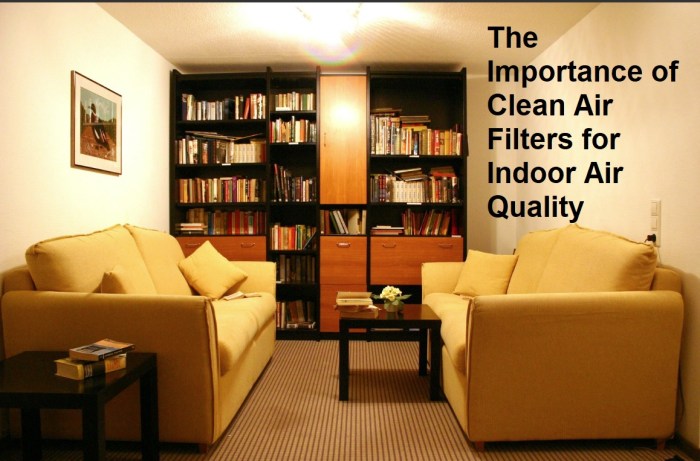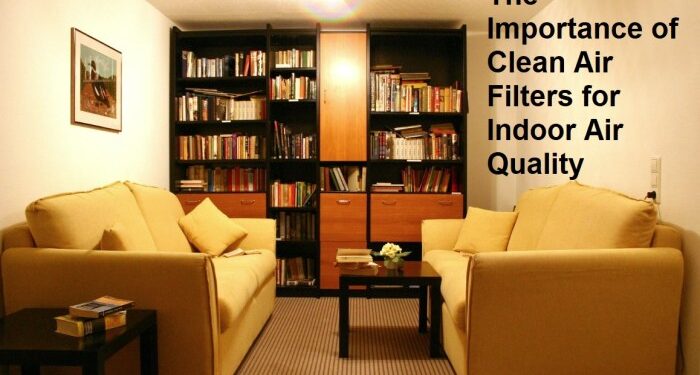Delving into the world of air conditioner filters and their profound influence on indoor air quality sets the stage for a captivating exploration. As we unravel the complexities of different filter types and their effects, a journey of discovering cleaner, healthier air begins.
Exploring the significance of regular maintenance and understanding the nuances of filter performance, this discussion promises to shed light on crucial aspects affecting the air we breathe indoors.
Importance of Air Conditioner Filters
Air conditioner filters play a crucial role in maintaining indoor air quality by trapping various contaminants and pollutants that can circulate in the air we breathe. By capturing these particles, filters help to improve the overall air quality in our living spaces.
Contaminants Trapped by Filters
- Dust and dirt particles
- Pollen
- Pet dander
- Mold spores
- Bacteria and viruses
Regularly changing filters can significantly impact the efficiency of an air conditioning system.
Types of Air Conditioner Filters

Air conditioner filters come in various types, each with its own set of advantages and drawbacks. Let's take a closer look at some of the most common filter materials available in the market today.
Fiberglass Filters
Fiberglass filters are the most basic and affordable option. They are designed to capture large particles like dust and debris, but they are not very effective at trapping smaller particles like pollen or pet dander. While fiberglass filters are budget-friendly, they need to be replaced frequently to maintain air quality.
Pleated Filters
Pleated filters are more efficient than fiberglass filters as they have a larger surface area for trapping particles. They are able to capture smaller particles, making them a better option for improving indoor air quality. However, pleated filters are more expensive than fiberglass filters and may restrict airflow if not replaced regularly.
HEPA Filters
HEPA (High Efficiency Particulate Air) filters are the gold standard when it comes to air filtration. These filters are capable of trapping up to 99.97% of particles as small as 0.3 microns, including allergens, mold spores, and bacteria. While HEPA filters are highly effective, they are also the most expensive option on the market.
Electrostatic Filters
Electrostatic filters use an electric charge to attract and trap particles. They are washable and reusable, making them a cost-effective option in the long run. However, electrostatic filters may lose their efficiency over time if not cleaned regularly. Additionally, they may produce ozone, which can be harmful to individuals with respiratory issues.
Factors Affecting Filter Performance
The performance of air conditioner filters can be influenced by various factors that impact indoor air quality. Factors such as filter size, MERV rating, maintenance frequency, and external contaminants play a crucial role in determining how effectively a filter can remove pollutants from the air.
Filter Size
The size of an air conditioner filter is important as it determines the amount of surface area available for trapping particles. Larger filters generally have more surface area, allowing them to capture more dust, pollen, and other contaminants
MERV Rating
The Minimum Efficiency Reporting Value (MERV) rating of a filter indicates its ability to capture particles of different sizes. Filters with higher MERV ratings are more efficient at trapping smaller particles, providing better indoor air quality. However, it is crucial to balance filtration efficiency with airflow to prevent strain on the HVAC system.
Maintenance Frequency
Regular maintenance of air conditioner filters is essential to ensure their effectiveness in removing pollutants from the air. Filters should be checked and replaced or cleaned according to the manufacturer's recommendations to maintain optimal performance. Neglecting filter maintenance can lead to reduced indoor air quality and increased energy consumption.
External Contaminants
External factors such as pet dander, smoke, pollen, and other pollutants can impact the lifespan and performance of air conditioner filters. Filters exposed to high levels of contaminants may become clogged more quickly, reducing their efficiency and requiring more frequent replacement.
It is important to address sources of external pollutants to extend the lifespan of filters and maintain indoor air quality.
Importance of Regular Maintenance
Regular maintenance of air conditioner filters is crucial for ensuring the efficiency of your HVAC system and maintaining good indoor air quality. Neglecting filter maintenance can lead to a variety of issues, including decreased airflow, reduced cooling/heating efficiency, and poor air quality due to the buildup of dirt, dust, and other contaminants in the filters.
Step-by-step Guide on Cleaning or Replacing Filters
To clean or replace your air conditioner filters correctly, follow these steps:
- Turn off the power to your HVAC system to prevent any accidents.
- Locate the air filter in your unit, usually found behind a removable panel on the air handler or return air grille.
- If the filter is reusable, remove it and gently vacuum or wash it according to the manufacturer's instructions. Make sure it is completely dry before reinstalling it.
- If the filter is disposable, simply remove it and replace it with a new one of the same size and type.
- Securely reattach the panel or grille and turn the power back on to your system.
Consequences of Neglecting Filter Maintenance
Neglecting air conditioner filter maintenance can have serious consequences on indoor air quality, including:
- Increased levels of airborne allergens and pollutants circulating in your home.
- Higher energy bills due to reduced system efficiency and increased strain on the HVAC unit.
- Potential damage to the HVAC system from excessive dirt and debris buildup, leading to costly repairs or premature replacement.
- Poor air quality can exacerbate respiratory issues and allergies, affecting the health and well-being of occupants.
Last Recap
In conclusion, the impact of air conditioner filters on indoor air quality cannot be overstated. From the importance of filter maintenance to the variety of filter types available, ensuring clean air indoors is a journey worth embarking on. Let's strive for a healthier living environment by recognizing the pivotal role of air conditioner filters in maintaining indoor air quality.
Frequently Asked Questions
How often should air conditioner filters be changed?
Air conditioner filters should typically be changed every 1 to 3 months, depending on usage and the type of filter.
Do HEPA filters really make a difference in indoor air quality?
HEPA filters are highly effective in trapping tiny particles, making a significant improvement in indoor air quality by reducing allergens and pollutants.
Can I clean and reuse air conditioner filters?
Some filters can be cleaned and reused, but it's important to follow manufacturer guidelines and ensure they are completely dry before reinstallation.















